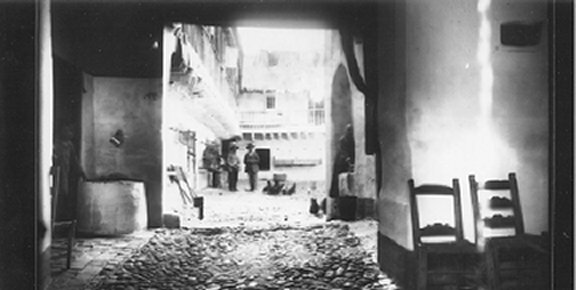Cervantes: Bulletin of the Cervantes Society of America
Volume XX, Number 2, Fall 2000
Posada del Potro.- Hospedería que remonta al siglo XVI, o antes. El barrio del Potro aludido en Don Quijote, I, 3 y 17. Foto de 1928, Cortesía Archivo Municipal de Córdoba.
THE CERVANTES SOCIETY OF AMERICA
President
CAROL B. JOHNSON (2000)
Vice President
EDWARD H. FRIEDMAN (2000)
Secretary-Treasurer
THERESA SEARS
Executive Council
| ELLEN ANDERSON | MW NINA COX DAVIS |
| MARINA BROWNLEE | NE PATRICIA KENWORTHY |
| ANTHONY CARDENAS | PC GEORGE MARISCAL |
| MICHAEL MCGAHA | SE ILUMINADA AMAT |
| ADRIANNE MARTIN | SW JOSEPH V. RICAPITO |
Cervantes: Bulletin of the Cervantes Society of America
Editor: DANIEL EISENBERG
Managing Editor: FRED JEHLE
Book Review Editor: WILLIAM H. CLAMURO
Editorial Board
| JOHN J. ALLEN | MYRIAM YVONNE JEHENSON |
| ANTONIO BERNAT | CARROLL B. JOHNSON |
| PATRIZIA CAMPANA | FRANCISCO MÁRQUEZ VILLANUEVA |
| PETER DUNN | FRANCISCO RICO |
| JAIME FERNÁNDEZ | GEORGE SHIPLEY |
| EDWARD H. FRIEDMAN | ALISON P. WEBER |
| AURELIO GONZÁLEZ | DIANA DE ARMAS WILSON |
Cervantes, official organ of the Cervantes Society of America, publishes scholarly articles in English and Spanish on Cervantes’ life and works, reviews, and notes of interest to cervantistas. Twice yearly. Subscription to Cervantes is a part of membership in the Cervantes Society of America, which also publishes a Newsletter. $20.00 a year for individuals and institutions, $30.00 for couples, and $10.00 for students. Membership is open to all persons interested in Cervantes. For membership and subscription, send check in dollars to DR. THERESA SEARS, Department of Romance Languages, University of North Carolina at Greensboro, Greensboro, NC 27402-6170. Manuscripts should be sent in duplicate, together with a self-addressed envelope and return postage, to DR. DANIEL EISSENBERG, Editor, Cervantes, Regents College, 7 Columbia Circle, Albany, NY 12203-5157. The SOCIETY requires anonymous submissions, therefore the author's name should not appear on the manuscript; instead, a cover sheet with the author's name, address, and the title of the article should accompany the article. References to the author's own work should be couched in the third person. Books for review should be sent to DR. WILLIAM CLAMURRO, Division of Foreign Languages, Emporia State University, Emporia, Kansas 66801-5087.
Copyright © 2000 by the Cervantes Society of America.
—5→
(Este ensayo trata de un punto debatido de la ortografía del inglés: si el posesivo de Cervantes es Cervantes' o Cervantes's.)
«How to form the possessive of polysyllabic personal namesending with the sound of s or z probably occasions moredissension among writers and editors than any other orthographic matter open to disagreement» (§ 6.30). Thus opines the Chicago Manual of Style, the most authoritative guide we have to academic English. This dissension can easily be seen in the titles of Cervantine books, even those published by university presses. If we have Cervantes's Exemplary Novels and the Adventure of Writing (Prisma Institute, distributed by U Minnesota Press), we also find Cervantes' Exemplary Fictions (U KentuckyPress). The same university press (Princeton) published both Cervantes' Christian Romance and Allegories of Love: Cervantes's Persiles and Sigismunda. The MLA Style Manual is unequivocal: «to form the possessive of any singular proper noun, add an apostrophe and an s» (§ 3.4.7.e). Yet the MLA's authority on this point is, to me, much reduced by its own usage: it published Approaches to Teaching Cervantes' Don Quixote.
Both Cervantes' and Cervantes's forms have also appeared in thisjournal. The ambiguity bothers me, and I cannot imagine a more appropriate forum than the pages of Cervantes to examine this question.
—6→The origins of the problem are in one of English's shortcomings. The same sound, unvoiced s, serves to mark both the plural and the possessive: cats and cat's are pronounced identically. Given this fact, it is possible, in speech, for the possessive to be unmarked: no one would pronounce Joneses', as in the Joneses' dog, with three syllables. That the dog belongs to the Joneses is indicated by word order. The apostrophe represents the «missing» possessive marker.
This ability to determine possession by position operates in thecase of Cervantes, as well as other words such as Herodotus' or Rabelais'. Perhaps I will be deluged with letters, but it is my observation that Cervantes', as in «Cervantes' Persiles» or «Cervantes' characters» is pronounced with three syllables, not four. Given this, a final s has no role to play. It is even misleading, suggesting a sound that is not present, and moves spelling further from pronunciation.
For all of these reasons, then, my preference and recommendation is that the possessive of Cervantes be Cervantes'.
| (§ 3.9.7) | ||
The Chicago Manual of Style. 14th ed. Chicago: University of Chicago Press, 1993.
Gibaldi, Joseph. MLA Style Manual and Guide to Scholarly Publishing. 2nd ed. New York: Modern Language Association of America,1998.
